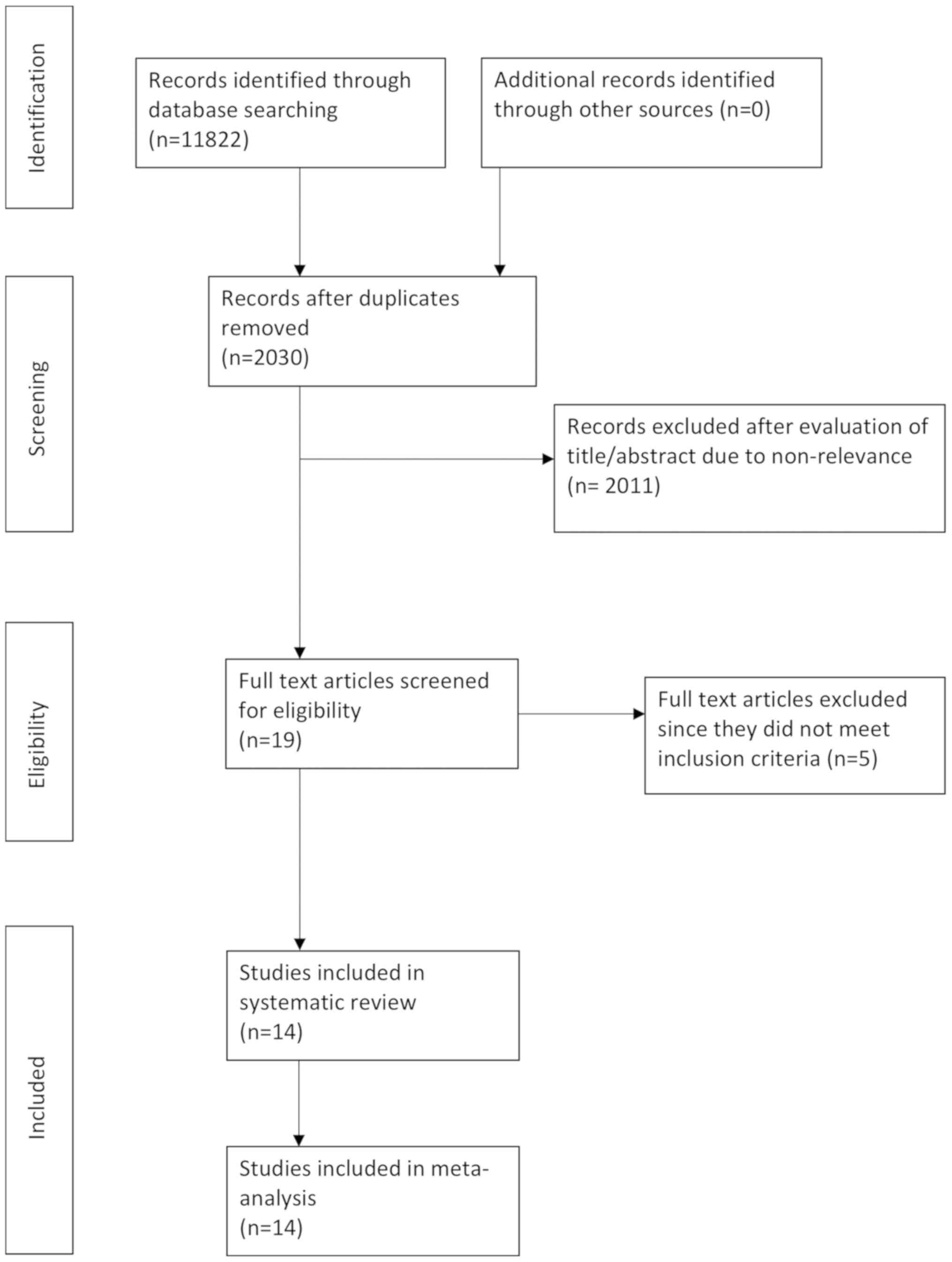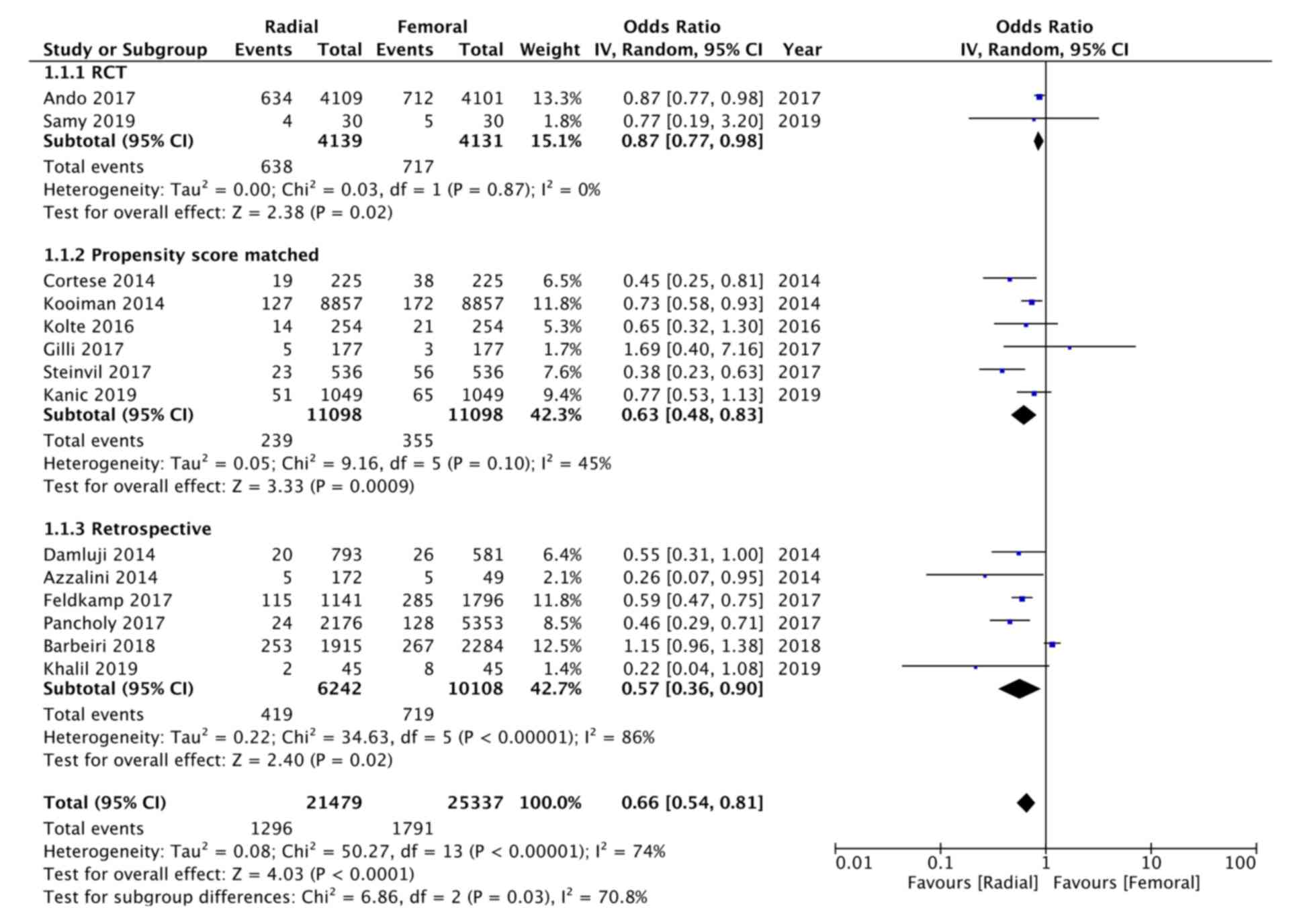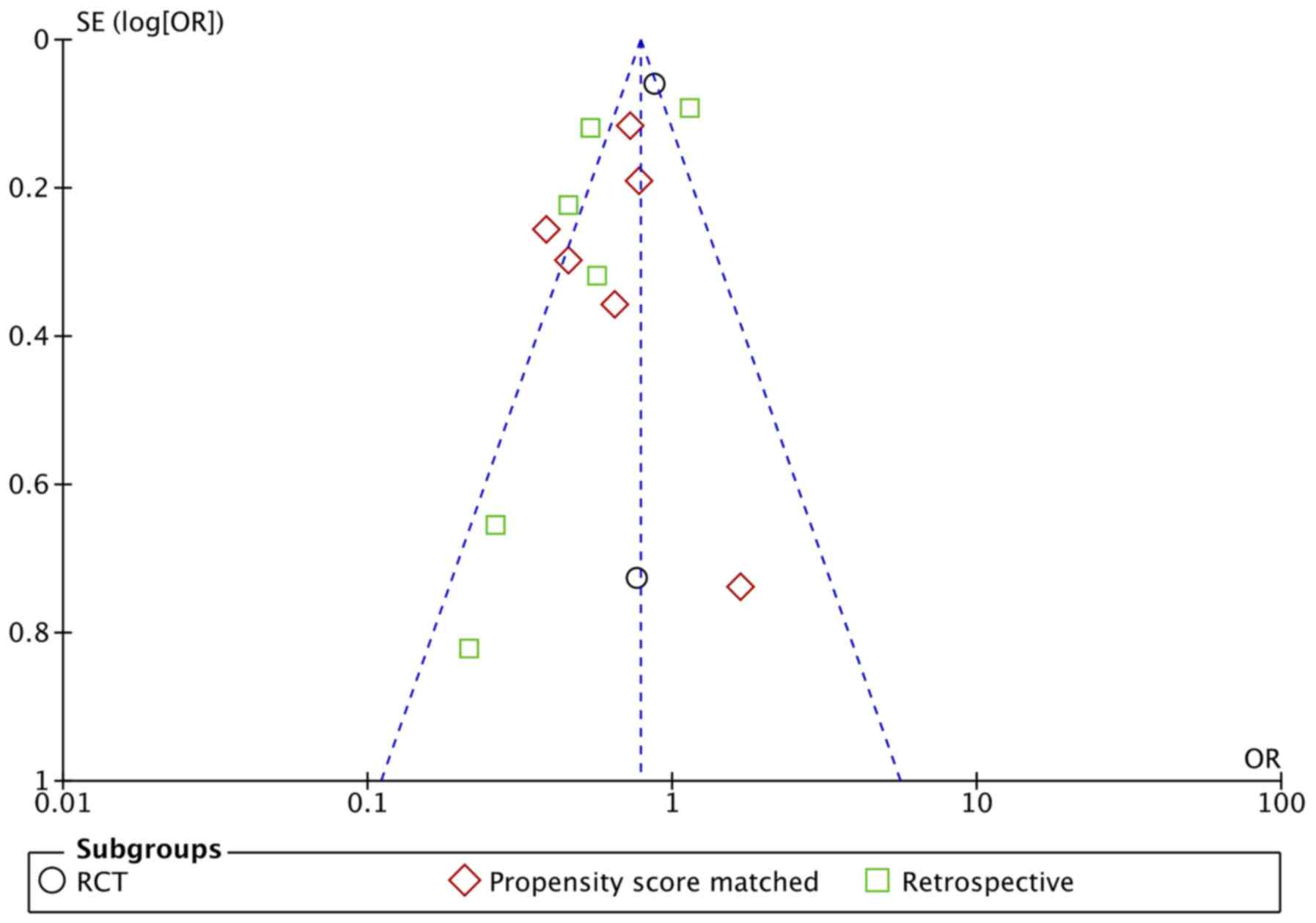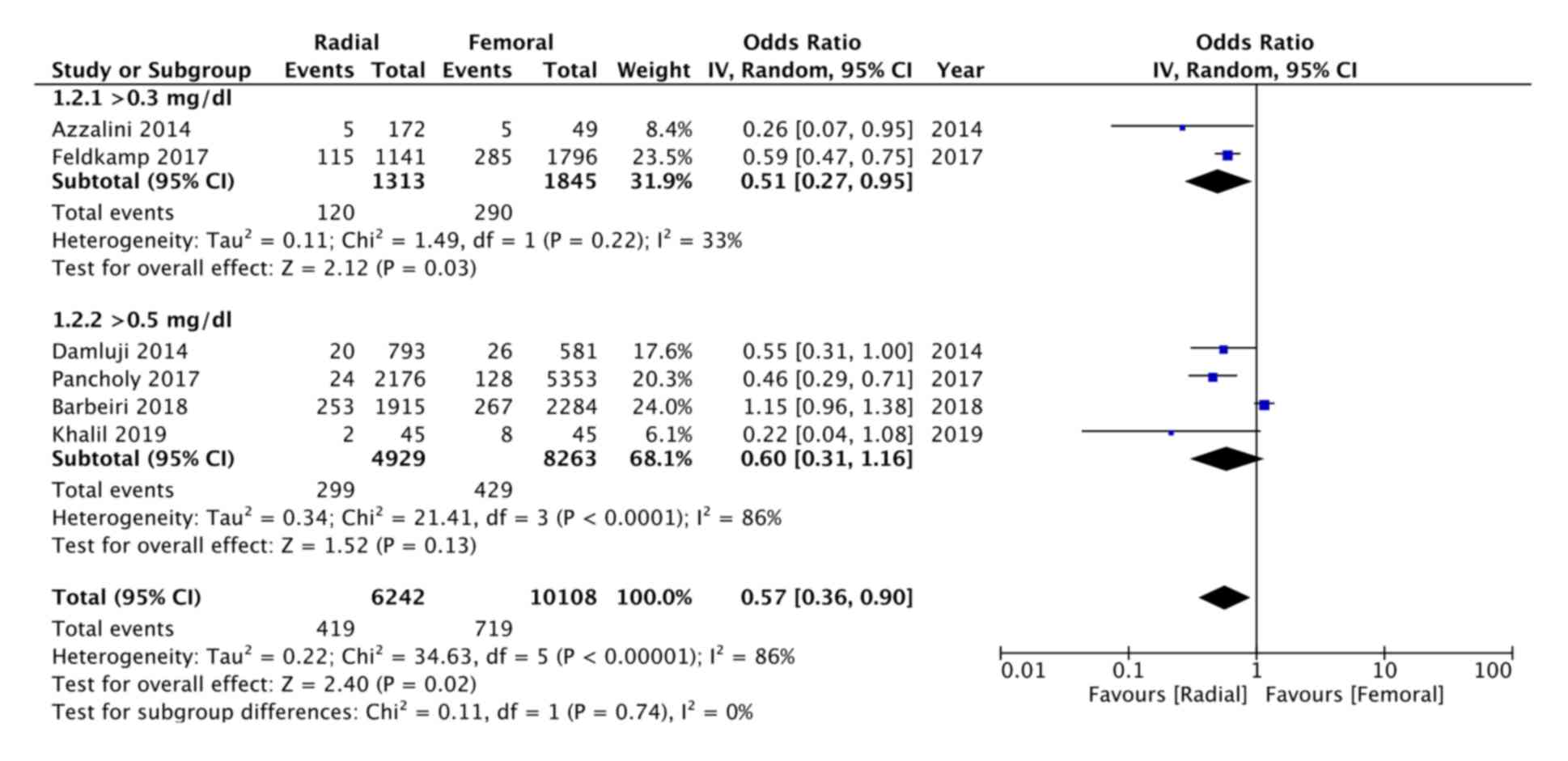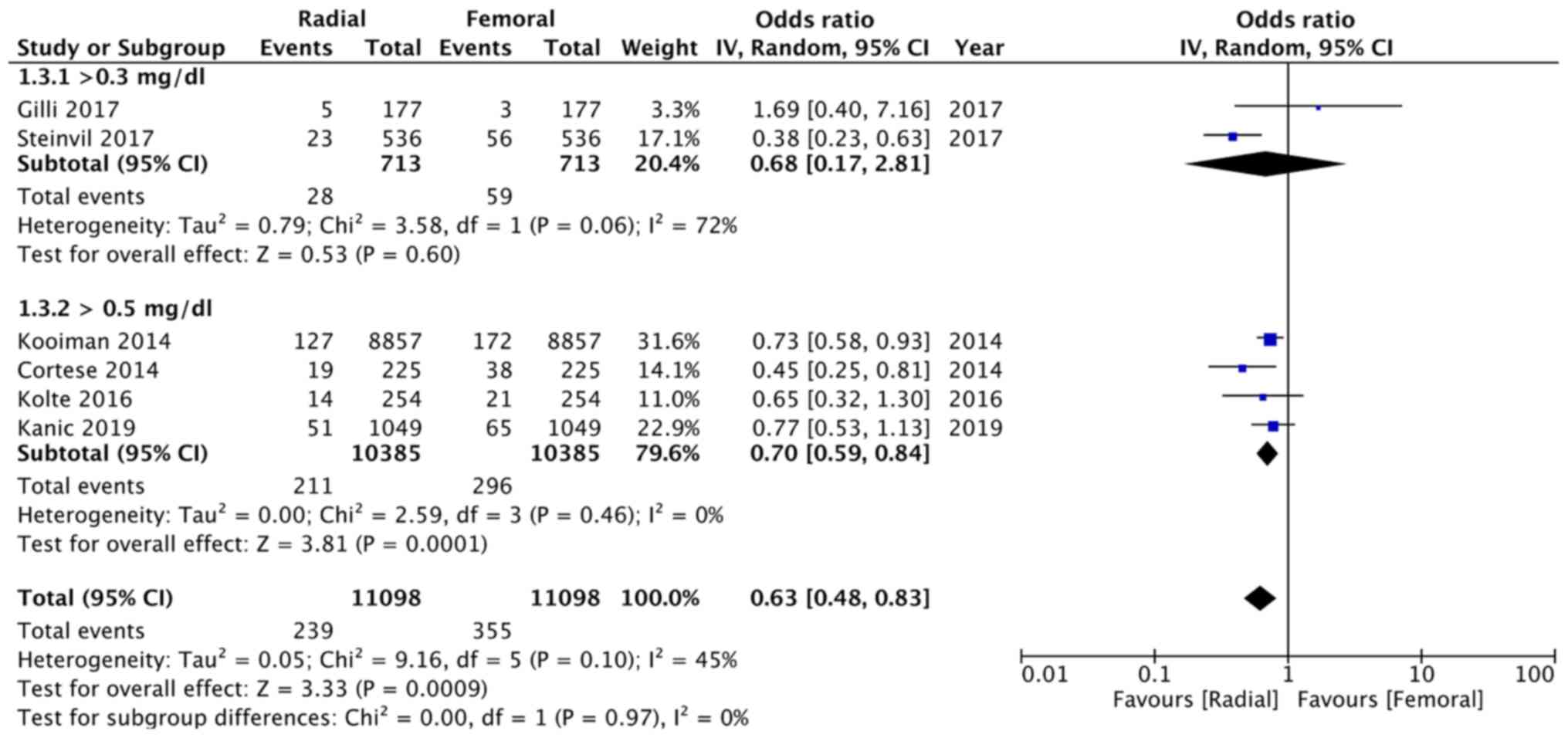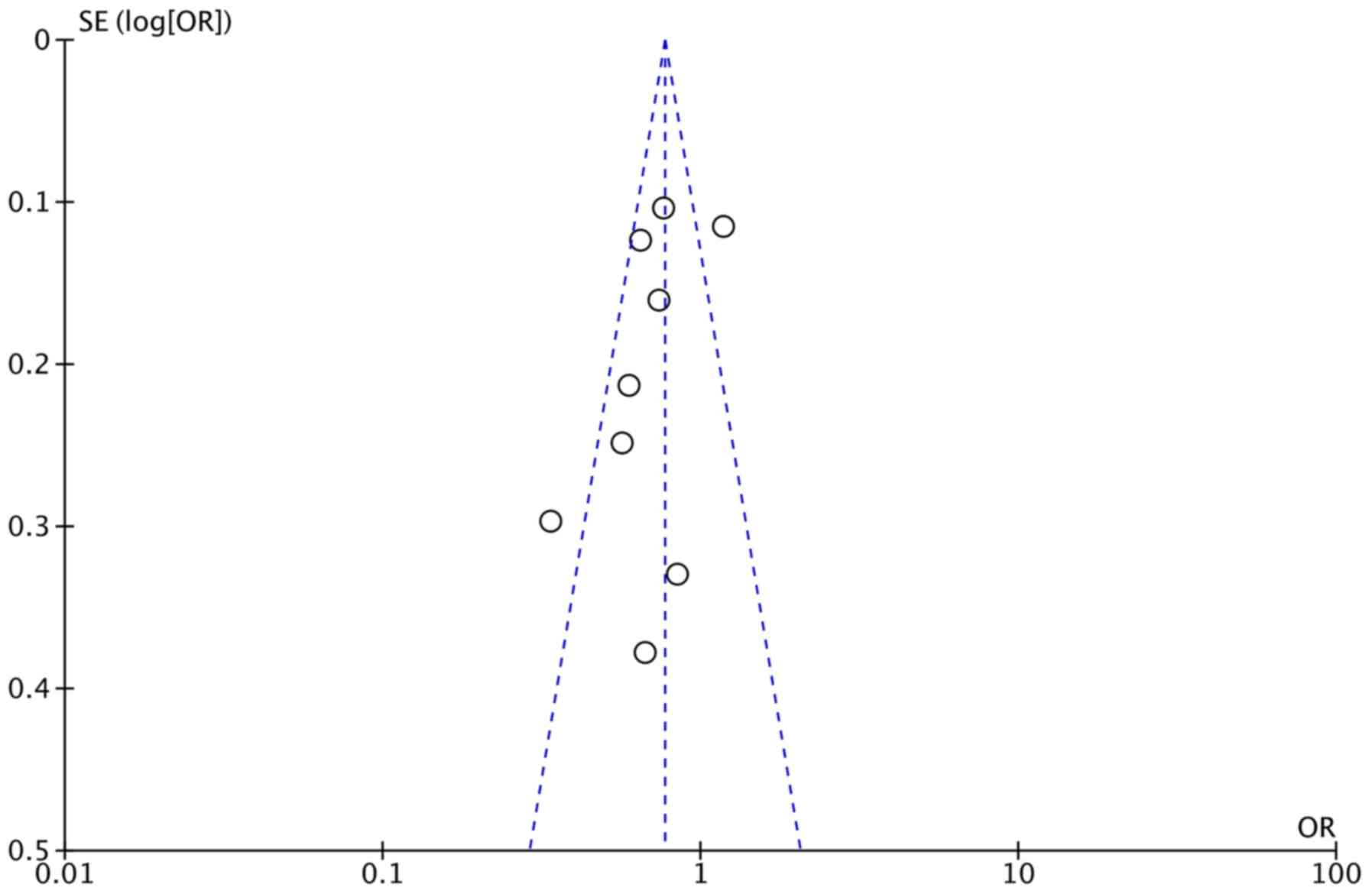|
1
|
Andò G, Costa F, Boretti I, Trio O and
Valgimigli M: Benefit of radial approach in reducing the incidence
of acute kidney injury after percutaneous coronary intervention: A
meta-analysis of 22,108 patien. Int J Cardiol. 179:309–311.
2015.PubMed/NCBI View Article : Google Scholar
|
|
2
|
Hossain MA, Costanzo E, Cosentino J, Patel
C, Qaisar H, Singh V, Khan T, Cheng JS, Asif A and Vachharajani TJ:
Contrast-induced nephropathy: Pathophysiology, risk factors, and
prevention. Saudi J Kidney Dis Transpl. 29:1–9. 2018.PubMed/NCBI View Article : Google Scholar
|
|
3
|
Mehran R, Aymong ED, Nikolsky E, Lasic Z,
Iakovou I, Fahy M, Mintz GS, Lansky AJ, Moses JW, Stone GW, et al:
A simple risk score for prediction of contrast-induced nephropathy
after percutaneous coronary intervention: Development and initial
validation. J Am Coll Cardiol. 44:1393–1399. 2004.PubMed/NCBI View Article : Google Scholar
|
|
4
|
Rihal CS, Textor SC, Grill DE, Berger PB,
Ting HH, Best PJ, Singh M, Bell MR, Barsness GW, Mathew V, et al:
Incidence and prognostic importance of acute renal failure after
percutaneous coronary intervention. Circulation. 105:2259–2264.
2002.PubMed/NCBI View Article : Google Scholar
|
|
5
|
Nijssen EC, Rennenberg RJ, Nelemans PJ,
Essers BA, Janssen MM, Vermeeren MA, Ommen VV and Wildberger JE:
Prophylactic hydration to protect renal function from intravascular
iodinated contrast material in patients at high risk of
contrast-induced nephropathy (AMACING): A prospective, randomised,
phase 3, controlled, open-label, non-inferiority trial. Lancet.
389:1312–1322. 2017.PubMed/NCBI View Article : Google Scholar
|
|
6
|
Feldkamp T and Kribben A: Contrast media
induced nephropathy: Definition, incidence, outcome,
pathophysiology, risk factors and prevention. Minerva Med.
99:177–196. 2008.PubMed/NCBI
|
|
7
|
Andò G, Gragnano F, Calabrò P and
Valgimigli M: Radial vs femoral access for the prevention of acute
kidney injury (AKI) after coronary angiography or intervention: A
systematic review and meta-analysis. Catheter Cardiovasc Interv.
92:E518–E526. 2018.PubMed/NCBI View Article : Google Scholar
|
|
8
|
Samy NI, Walaafareed Ahmed AAS and Osama
M: Contrast Induced Nephropathy after radial or femoral access for
invasive management of acute coronary syndrome. World J Cardiovasc
Dis. 9:572–583. 2019.
|
|
9
|
Gili S, D'Ascenzo F, Di Summa R, Conrotto
F, Cerrato E, Chieffo A, Boccuzzi G, Montefusco A, Ugo F, Omedé P,
et al: Radial versus femoral access for the treatment of left main
lesion in the era of second-generation drug-eluting stents. Am J
Cardiol. 120:33–39. 2017.PubMed/NCBI View Article : Google Scholar
|
|
10
|
Andò G, Cortese B, Russo F, Rothenbühler
M, Frigoli E, Gargiulo G, Briguori C, Vranckx P, Leonardi S,
Guiducci V, et al: Acute kidney injury after radial or femoral
access for invasive acute coronary syndrome management: AKI-MATRIX.
J Am Coll Cardiol, May 11, 2017 (Online ahead of print).
|
|
11
|
Khalil WA, Abdelhameed MG, Elmenshawy MD
and Elhelaly A: Serum cystatin c and renal dysfunction in
transradial versus transfemoral approaches in primary percutaneous
coronary intervention. J Indian Coll Cardiol. 9:88–94. 2019.
|
|
12
|
Kanic V, Kompara G, Šuran D, Tapajner A,
Naji FH and Sinkovic A: Acute kidney injury in patients with
myocardial infarction undergoing percutaneous coronary intervention
using radial versus femoral access. BMC Nephrol.
20(28)2019.PubMed/NCBI View Article : Google Scholar
|
|
13
|
Moher D, Liberati A, Tetzlaff J and Altman
DG: PRISMA Group. Preferred reporting items for systematic reviews
and meta-analyses: The PRISMA statement. PLoS Med.
6(e1000097)2009.PubMed/NCBI View Article : Google Scholar
|
|
14
|
Higgins JPT, Altman DG and Sterne JAC
(eds): Cochrane statistical methods group and the cochrane bias
methods group. Chapter 8: Assessing risk of bias in included
studies. In: Cochrane Handbook for Systemic Reviews of
Interventions, Version 5. The Cochrane Collaboration, 2011.
|
|
15
|
Kim SY, Park JE, Lee YJ, Seo HJ, Sheen SS,
Hahn S, Jang BH and Son HJ: Testing a tool for assessing the risk
of bias for nonrandomized studies showed moderate reliability and
promising validity. J Clin Epidemiol. 66:408–414. 2013.PubMed/NCBI View Article : Google Scholar
|
|
16
|
Valgimigli M, Gagnor A, Calabró P, Frigoli
E, Leonardi S, Zaro T, Rubartelli P, Briguori C, Andò G, Repetto A,
et al: Radial versus femoral access in patients with acute coronary
syndromes undergoing invasive management: A randomised multicentre
trial. Lancet. 385:2465–2476. 2015.PubMed/NCBI View Article : Google Scholar
|
|
17
|
Rothenbühler M, Valgimigli M, Odutayo A,
Frigoli E, Leonardi S, Vranckx P, Turturo M, Moretti L, Amico F,
Uguccioni L, et al: Association of acute kidney injury and bleeding
events with mortality after radial or femoral access in patients
with acute coronary syndrome undergoing invasive management:
Secondary analysis of a randomized clinical trial. Eur Heart J.
40:1226–1232. 2019.PubMed/NCBI View Article : Google Scholar
|
|
18
|
Alonzo A, Rigattieri S, Giovannelli F, Di
Russo C, Sciahbasi A, Berni A and Volpe M: Transfemoral approach
with systematic use of FemoSeal™ closure device compared to
transradial approach in primary angioplasty. Catheter Cardiovasc
Interv. 87:849–854. 2016.PubMed/NCBI View Article : Google Scholar
|
|
19
|
Ratib K, Mamas MA, Anderson SG, Bhatia G,
Routledge H, De Belder M, Ludman PF, Fraser D and Nolan J: British
Cardiovascular Intervention Society and the National Institute for
Cardiovascular Outcomes Research. Access site practice and
procedural outcomes in relation to clinical presentation in 439,947
patients undergoing percutaneous coronary intervention in the
United kingdom. JACC Cardiovasc Interv. 8:20–29. 2015.PubMed/NCBI View Article : Google Scholar
|
|
20
|
Mamas MA, Ratib K, Routledge H, Neyses L,
Fraser DG, de Belder M, Ludman PF and Nolan J: British
Cardiovascular Intervention Society and the National Institute for
Cardiovascular Outcomes Research. Influence of arterial access site
selection on outcomes in primary percutaneous coronary
intervention: Are the results of randomized trials achievable in
clinical practice? JACC Cardiovasc Interv. 6:698–706.
2013.PubMed/NCBI View Article : Google Scholar
|
|
21
|
Pancholy MS, Skelding K, Scott T,
Blankenship J and Pancholy SB: Effect of access site choice on
acute kidney injury after percutaneous coronary intervention. Am J
Cardiol. 120:2141–2145. 2017.PubMed/NCBI View Article : Google Scholar
|
|
22
|
Steinvil A, Garcia-Garcia HM, Rogers T,
Koifman E, Buchanan K, Alraies MC, Torguson R, Pichard AD, Satler
LF, Ben-Dor I and Waksman R: Comparison of propensity score-matched
analysis of acute kidney injury after percutaneous coronary
intervention with transradial versus transfemoral approaches. Am J
Cardiol. 119:1507–1511. 2017.PubMed/NCBI View Article : Google Scholar
|
|
23
|
Feldkamp T, Luedemann M, Spehlmann ME,
Freitag-Wolf S, Gaensbacher J, Schulte K, Bajrovic A, Hinzmann D,
Hippe HJ, Kunzendorf U, et al: Radial access protects from contrast
media induced nephropathy after cardiac catheterization procedures.
Clin Res Cardiol. 107:148–157. 2018.PubMed/NCBI View Article : Google Scholar
|
|
24
|
Barbieri L, Verdoia M, Suryapranata H and
De Luca G: Novara Atherosclerosis Study Group (NAS). Impact of
vascular access on the development of contrast induced nephropathy
in patients undergoing coronary angiography and/or percutaneous
coronary intervention. Int J Cardiol. 275:48–52. 2019.PubMed/NCBI View Article : Google Scholar
|
|
25
|
Kooiman J, Seth M, Dixon S, Wohns D,
LaLonde T, Rao SV and Gurm HS: Risk of acute kidney injury after
percutaneous coronary interventions using radial versus femoral
vascular access: Insights from the blue cross blue shield of
michigan cardiovascular consortium. Circ Cardiovasc Interv.
7:190–198. 2014.PubMed/NCBI View Article : Google Scholar
|
|
26
|
Azzalini L, Khan R, Al-Hawwas M, Hatem R,
Fortier A, L'Allier PL and Ly HQ: Effect of radial-to-femoral
access crossover on adverse outcomes in primary percutaneous
coronary intervention. Am J Cardiol. 114:1165–1173. 2014.PubMed/NCBI View Article : Google Scholar
|
|
27
|
Cortese B, Sciahbasi A, Sebik R,
Rigattieri S, Alonzo A, Silva-Orrego P, Belloni F, Seregni RG,
Giovannelli F, Tespili M, et al: Comparison of risk of acute kidney
injury after primary percutaneous coronary interventions with the
transradial approach versus the transfemoral approach (from the
PRIPITENA urban registry). Am J Cardiol. 114:820–825.
2014.PubMed/NCBI View Article : Google Scholar
|
|
28
|
Damluji A, Cohen MG, Smairat R, Steckbeck
R, Moscucci M and Gilchrist IC: The incidence of acute kidney
injury after cardiac catheterization or PCI: A comparison of radial
vs. femoral approach. Int J Cardiol. 173:595–597. 2014.PubMed/NCBI View Article : Google Scholar
|
|
29
|
Kolte D, Spence N, Puthawala M, Hyder O,
Tuohy CP, Davidson CB, Sheldon MW, Laskey WK and Abbott JD:
Association of radial versus femoral access with contrast-induced
acute kidney injury in patients undergoing primary percutaneous
coronary intervention for ST-elevation myocardial infarction.
Cardiovasc Revasc Med. 17:546–551. 2016.PubMed/NCBI View Article : Google Scholar
|
|
30
|
Likosky DS, Van Parys J, Zhou W, Borden
WB, Weinstein MC and Skinner JS: Association between medicare
expenditure growth and mortality rates in patients with acute
myocardial infarction: A comparison from 1999 through 2014. JAMA
Cardiol. 3:114–122. 2018.PubMed/NCBI View Article : Google Scholar
|
|
31
|
Burns PB, Rohrich RJ and Chung KC: The
levels of evidence and their role in evidence-based medicine. Plast
Reconstr Surg. 128:305–310. 2011.PubMed/NCBI View Article : Google Scholar
|
|
32
|
Biondi-Zoccai G, Romagnoli E, Agostoni P,
Capodanno D, Castagno D, D'Ascenzo F, Sangiorgi G and Modena MG:
Are propensity scores really superior to standard multivariable
analysis? Contemp Clin Trials. 32:731–740. 2011.PubMed/NCBI View Article : Google Scholar
|
|
33
|
Baser O: Choosing propensity score
matching over regression adjustment for causal inference: When, why
and how it makes sense. J Med Econ. 10:379–391. 2007.
|
|
34
|
Kellum JA and Lameire N: KDIGO AKI
Guideline Work Group. Diagnosis, evaluation, and management of
acute kidney injury: A KDIGO summary (Part 1). Crit Care.
17(204)2013.PubMed/NCBI View
Article : Google Scholar
|
|
35
|
Morcos SK, Thomsen HS and Webb JA:
Contrast-media-induced nephrotoxicity: A consensus report. Contrast
media safety committee, european society of urogenital radiology
(ESUR). Eur Radiol. 9:1602–1013. 1999.PubMed/NCBI View Article : Google Scholar
|
|
36
|
Scolari F, Ravani P, Gaggi R, Santostefano
M, Rollino C, Stabellini N, Colla L, Viola BF, Maiorca P,
Venturelli C, et al: The challenge of diagnosing atheroembolic
renal disease: Clinical features and prognostic factors.
Circulation. 116:298–304. 2007.PubMed/NCBI View Article : Google Scholar
|















